Spending Ramadan in Jordan: Everything you need to know
A Jewish solo female traveler decides to spend Ramadan in Jordan … no, this isn’t the beginning of a bad joke. This is a true story of my visit to this Muslim-majority country during the sacred month of fasting and reflection.
NOTE: This is a guest post by Cat Roberts. She also provided all the photos except as marked.
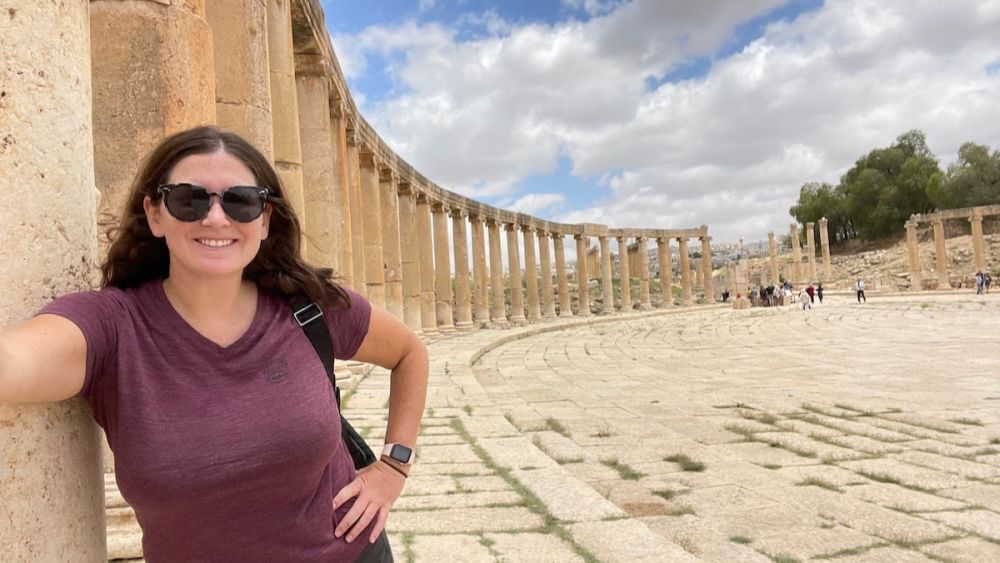
Disclosure: This article contains affiliate links. If you click on an affiliate link and spend money, I (Rachel) will receive a small commission. This will not affect your price.
I was initially hesitant, unsure of how my presence as a non-Muslim would be received during such an important religious period. But after doing some research, I decided to experience Ramadan in Jordan for myself.
I was pleasantly surprised when two different families welcomed me into their homes for Eid al-Fitr – the happy celebration at the end of Ramadan. It gave me an amazing look into Jordanian hospitality that I might not have seen at another time.
A note from Rachel: After Cat sent me this article, I contacted her with some follow-up questions about traveling as a Jew in Jordan. She said she felt warmly welcomed in Jordan, and I must say so did I when I was there. However, I would recommend being very careful, especially these days, of telling people that you’re Jewish. Even before the war in Gaza, anti-Semitism was on the increase in many countries – not only the Middle East – and you need to be careful of your own safety. Use your best judgement.
These are the stories I bring as a seasoned solo traveler, sharing insights for those thinking about spending Ramadan in Jordan. While it may initially seem daunting, my experiences and advice aim to reassure you that this journey can be incredibly rewarding – filled with unexpected encounters, cultural immersion, and personal growth.
So if you’re wondering whether to go or not – take it from someone who’s been there: pack your bags for an unforgettable adventure!
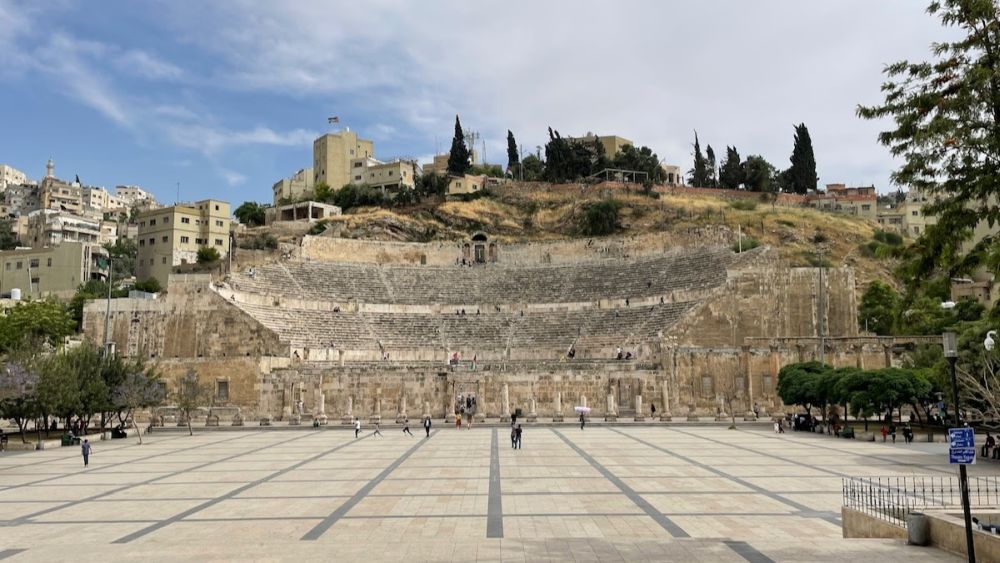
What is Ramadan?
First things first: what exactly is Ramadan?
During this month-long observation, Muslims around the world abstain from eating, drinking, smoking, and engaging in any physical pleasures from dawn until sunset. This fast is intended to bring about spiritual purification and self-discipline. Muslims pray together in the mosque and read the Quran.
After sunset, families gather for iftar – the breaking of the fast – with a feast of traditional dishes and sweets. The feast traditionally starts with dates or apricots and water or sweetened milk.
In Jordan, many people have shortened work hours during Ramadan so that they have more time to pray.
The end of Ramadan is called Eid al-Fitr a.k.a. “The Feast of Fast-Breaking.” It’s one of the two most important religious holidays in Islam – and I got to join two families to celebrate!
When is Ramadan?
Ramadan – observed for one month every year – always occurs during the ninth month of the Muslim calendar. The Muslim calendar doesn’t perfectly match the Gregorian calendar, so Ramadan dates shift year to year, moving about 10-12 days earlier each year.
The exact beginning and end of Ramadan depend on the Islamic lunar calendar. It officially begins and ends with the appearance of the crescent moon.
Mark your calendars – here are the dates of Ramadan for the next few years:
- Ramadan 2024: March 10-April 9
- Ramadan 2025: February 28-March 30
- Ramadan 2026: February 17-March 18
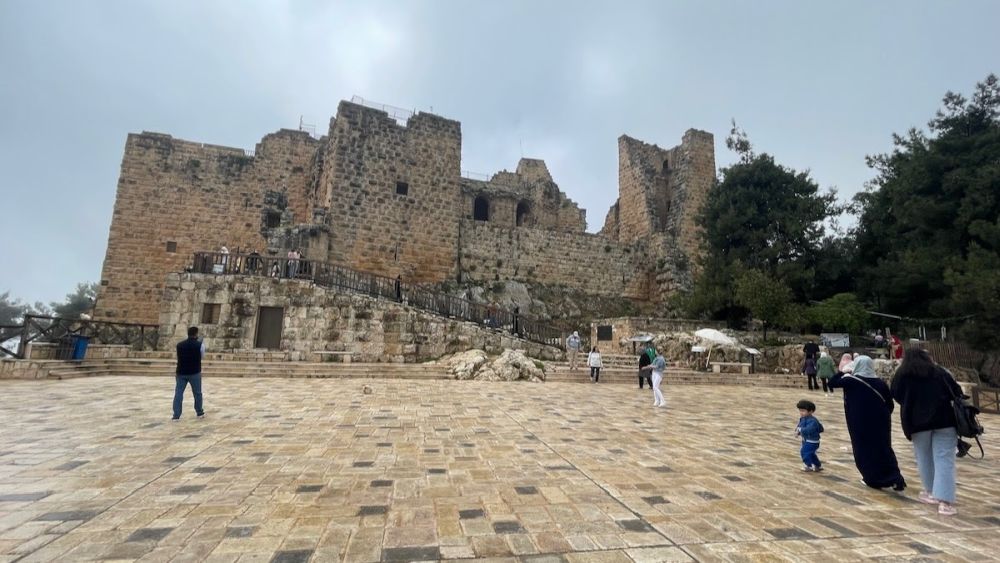
Should you spend Ramadan in Jordan as a tourist?
I didn’t exactly plan to spend Ramadan in Jordan; it just kind of happened that way.
Most things in Jordan were operating as usual, with some exceptions. There were some challenges, but overall, I’m so glad I visited Jordan during this holy time, as it gave me a unique and memorable cultural experience. It allowed me to experience Jordanian culture in a way that I wouldn’t have been able to otherwise.
I loved how festive the country felt every day at sundown when the fast was broken. Families and friends gathered together to share a meal, and the streets were filled with people.
A lot of tourists don’t want to visit during Ramadan, which in my opinion makes it the perfect time to visit!
Look here for accommodations in Aqaba, Petra, Wadi Rum, Amman, Jerash, Irbid or near the Dead Sea.
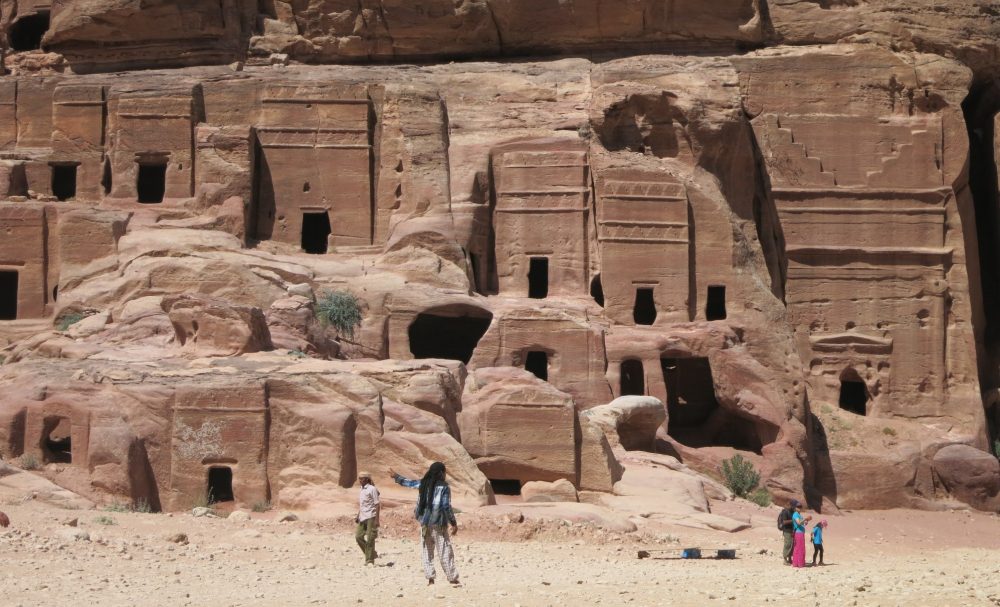
If you want to see many different sights around the country, consider picking up a rental car at the airport on arrival.
Are restaurants open during Ramadan in Jordan?
Non-Muslims are not required to fast, and Jordanians are extremely understanding that many tourists are not Muslim, but tourists should be respectful and follow the local customs. That means you should not eat or drink during the day in public or around fasting Muslims if you can help it. It’s not a strict rule, just a courtesy. How would you feel if you weren’t allowed to eat or drink and people started eating and drinking right in front of you? I would hate it!
I was in Aqaba in the south of Jordan for a few days during Ramadan, and I found that most restaurants were closed during the day. Since this was my first stop, I wasn’t really prepared. I didn’t have any snacks on hand, so I ended up fasting for a couple of days. From then on, I got better at having some food with me to eat during the day!
But I heard from others that the Red Sea resorts were serving food as normal. And while some restaurants in Amman and Petra closed during daylight hours, plenty of cafes stayed open.
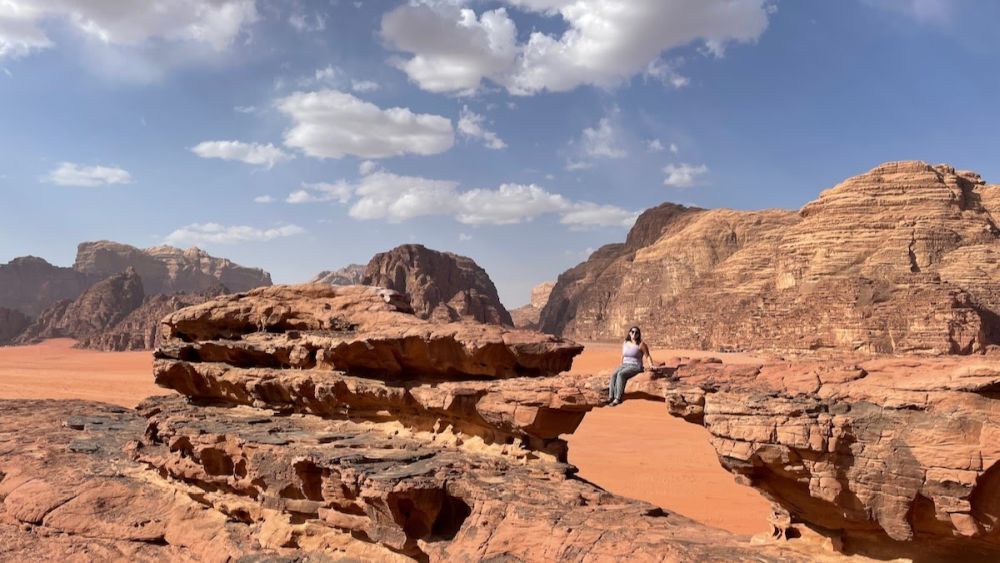
Can you drink alcohol during in Jordan during Ramadan?
Alcohol sales may be limited, but they’re not altogether absent. It’s generally understood that non-Muslim tourists won’t follow all the Ramadan customs, but you’ll want to drink in private, away from practicing Muslims during this time.
After two days of diving in the Red Sea, I wanted to grab a beer with my scuba guide. We found an Irish bar serving alcohol indoors only (so as not to be disrespectful) – they had great burgers, too!
Another example – My friend from Israel joined me for an overnight in Wadi Rum, and we envisioned drinking a bottle of wine under the stars. After a few failed attempts, we found a restaurant in Petra that was willing to sell us a bottle of wine before we drove to the desert, but they made sure to do it out of sight of the other patrons.
Are tourist sites open during Ramadan in Jordan?
Good news – most tourist sites remain open during Ramadan! Some open a little later than normal and close a bit earlier.
Here’s a schedule of opening hours for Jordan’s most popular tourist sites during Ramadan, taken from the Jordan Pass site:
- Petra is open from 6:30 – 17:30.
- Wadi Rum is open all the time.
The following tourist sites are open from 9:00-17:00:
- Jordan Archaeological Museum and the Citadel
- The Folklore Museum (Roman Theater Amman)
- Roman Theater/ Amman and Odeon
- The Archaeological Museum, Archaeological Park and Church of Apostles / Madaba
- Umm Qays
- Ajloun Castle
- Karak Castle and Museum
- Al- Shareef Al- Hussein Bin Ali’s House Museum / Aqaba
- Desert Castles
- Jerash Archaeological Site and Museum
- Saraya Museum / Irbid
Tips for making the most of Ramadan in Jordan
You’ll enjoy Ramadan in Jordan with these handy tips:
1. Respect local traditions.
Remember, it’s customary not to drink or snack in public during daylight hours. If you feel parched or peckish, try to do so subtly, out of sight of other people. That means eating in your hotel room or indoors at a cafe, if you can find one that is open.
2. Pack a snack and water.
And speaking of eating, it’s always a good idea to carry some munchies with you. Hunting for an open restaurant when hunger strikes can be challenging – but don’t worry, most eateries catering to tourists stay open.
3. Be kind.
Most locals will be fasting the whole day – sunrise to sunset. Yet, if they work in the tourism industry, they may still have to put in a full day’s work. Be kind and avoid making unnecessary demands on their energy.
4. Be mindful of time.
As you plan your Jordan itinerary, note that many tourist sites, shops, and banks have adjusted timings. They often open late and close early.
5. Dinner plans? Reserve ahead.
If you want to enjoy a meal at sunset – the time when locals break their fast – make sure you’ve booked a table in advance. Or have a later dinner, since most locals will have eaten by then.
6. Soak up the atmosphere at dusk.
Don’t miss the chance to witness the city come alive at sunset! Stroll down the streets for an authentic experience filled with fun and laughter.
7. Say yes to invitations.
If a local extends an invite for Iftar – the meal with which they end their daily fast – jump on it! It’s a unique opportunity to delve deep into Jordanian culture.
8. Don’t forget dessert!
Make sure you try katayef. This mouthwatering pancake is stuffed with nuts or cheese, deep-fried, and drenched in syrup—a quintessential Ramadan delicacy!
As long as you keep these tips in mind, your visit to Jordan during Ramadan will surely be memorable and culturally enriching!
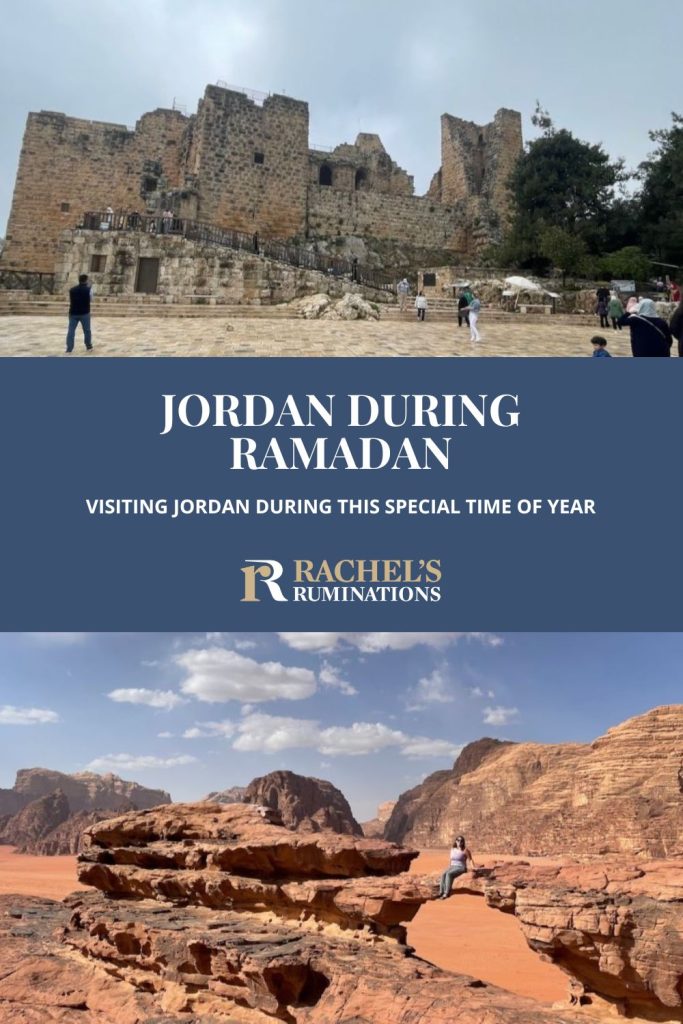
Final thoughts: What’s it like to spend Ramadan in Jordan?
Spending Ramadan in Jordan as a tourist offers a chance to experience Jordanian culture on a level that you might otherwise not get to.
While you can still see and do everything in your itinerary, there are a few things to keep in mind during this time. Many restaurants will close during the day, alcohol sales will be limited, and some tourist sites may alter their normal hours. I recommend keeping some snacks on hand just in case!
I’ll never forget breaking the fast with the family who ran my Petra bed-and-breakfast or going from house to house with another host to eat sweets and drink special coffee with his family. I never would have had these experiences if I had visited Jordan any other time of the year.
So, if you’re intrigued by cultural immersion and aren’t deterred by a few minor adjustments, spending Ramadan in Jordan could make for an unforgettable trip! Ramadan Kareem!

